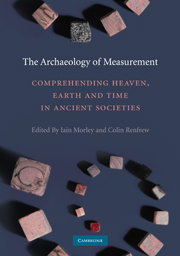Book contents
- Frontmatter
- Contents
- List of figures and tables
- List of contributors
- Acknowledgements
- The Archaeology of Measurement
- Introduction: Measure: Towards the construction of our world
- SECTION I NUMBER: COUNTING, MATHEMATICS AND MEASURE
- SECTION II MATERIALISING THE ECONOMY
- SECTION III DIMENSIONS AND BELIEF
- SECTION IV CALENDAR AND COSMOLOGY
- SECTION V THE SPIRITUALITY OF MEASURE
- 19 The roots of spirituality and the limits of human mensuration
- 20 Worldview, measurement and ‘the roots of spirituality’
- Index
19 - The roots of spirituality and the limits of human mensuration
Published online by Cambridge University Press: 05 June 2012
- Frontmatter
- Contents
- List of figures and tables
- List of contributors
- Acknowledgements
- The Archaeology of Measurement
- Introduction: Measure: Towards the construction of our world
- SECTION I NUMBER: COUNTING, MATHEMATICS AND MEASURE
- SECTION II MATERIALISING THE ECONOMY
- SECTION III DIMENSIONS AND BELIEF
- SECTION IV CALENDAR AND COSMOLOGY
- SECTION V THE SPIRITUALITY OF MEASURE
- 19 The roots of spirituality and the limits of human mensuration
- 20 Worldview, measurement and ‘the roots of spirituality’
- Index
Summary
‘Measuring the World and Beyond’ was the official title of the conference that led to this book. In my response to the papers that became the chapters of this book and the discussion, I would like to focus on the phrase ‘and Beyond’ as a point of entry into the broader issue explored by this particular symposium and the project as a whole – the roots of spirituality. The archaeological insights gathered from data analysis around the globe shed new light on the extent to which the construction of modes of measurement in early cultures functioned as a new means of recognizing and engaging with the material world. How is this related to that which we experience as ‘beyond’ the world, ‘beyond’ measurement?
From a philosophical and theological point of view, it is not simply the emergence of the capacity for mensuration that makes early human cultures interesting but also, and even especially, the growing self-awareness among human beings of their lack of capacity in this regard. That is, the human construction of measurement may be a manifestation both of an evolutionary and an adaptive skill for controlling the environment and of an awakening to the recognition of the limits of adaptation mechanisms for manipulating the cosmos. Alongside the discovery of the susceptibility of the world to measurement arose the discovery of the concept of the immeasurable, which invites questions about spirituality and religious awareness.
- Type
- Chapter
- Information
- The Archaeology of MeasurementComprehending Heaven, Earth and Time in Ancient Societies, pp. 247 - 249Publisher: Cambridge University PressPrint publication year: 2010

